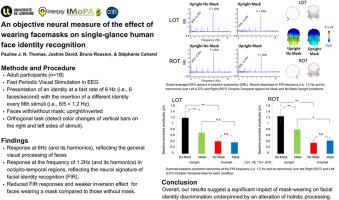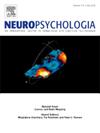戴口罩对单目人脸识别效果的客观神经测量
IF 2
3区 心理学
Q3 BEHAVIORAL SCIENCES
引用次数: 0
摘要
正如在2019冠状病毒病大流行期间和之后所强调的那样,戴口罩会严重影响人类的社交互动,尤其是阻碍面部识别。在这里,我们用客观的隐式方法测量了与戴口罩相关的单目面部身份识别的减少。对一组被试进行脑电图(EEG)记录,这些被试以6 Hz的频率观看相同的不熟悉的人脸识别照片,每5次刺激被不同的人脸识别照片打断。对于戴口罩的人脸,双侧枕颞皮质的1.2 Hz和谐波的人脸识别神经反应显著降低了约40%。这种减少是特定于直立的脸,低信号倒立的脸不受口罩的影响。总的来说,这些发现表明,戴口罩对单眼面部身份识别有显著影响,其基础是面部下半部分提供的诊断线索的直接改变,以及整体面部感知提供的上半部分的诊断能力的间接降低。本文章由计算机程序翻译,如有差异,请以英文原文为准。

An objective neural measure of the effect of wearing facemasks on single-glance human face identity recognition
As highlighted during and since the COVID-19 pandemic, wearing facemasks significantly impacts human social interactions, notably by hindering facial recognition. Here we measured the reduction of single-glance facial identity recognition associated with wearing facemasks with an objective implicit approach. Electroencephalographic (EEG) recordings were conducted in a group of participants presented with the same unfamiliar face identity photograph at a 6 Hz frequency, interrupted by different face identities every 5 stimuli. For faces wearing a mask, the neural face identity recognition response at 1.2 Hz and harmonics was significantly reduced by about 40 % over the bilateral occipito-temporal cortex. This reduction was specific to upright faces, with the lower signal to inverted faces being unaffected by facemasks. Overall, these findings suggest a significant impact of mask-wearing on single-glance face identity recognition underpinned both by a direct alteration of diagnostic cues provided by the bottom half of the face and an indirect decreased diagnosticity of the top face half typically provided by holistic face perception.
求助全文
通过发布文献求助,成功后即可免费获取论文全文。
去求助
来源期刊

Neuropsychologia
医学-行为科学
CiteScore
5.10
自引率
3.80%
发文量
228
审稿时长
4 months
期刊介绍:
Neuropsychologia is an international interdisciplinary journal devoted to experimental and theoretical contributions that advance understanding of human cognition and behavior from a neuroscience perspective. The journal will consider for publication studies that link brain function with cognitive processes, including attention and awareness, action and motor control, executive functions and cognitive control, memory, language, and emotion and social cognition.
 求助内容:
求助内容: 应助结果提醒方式:
应助结果提醒方式:


